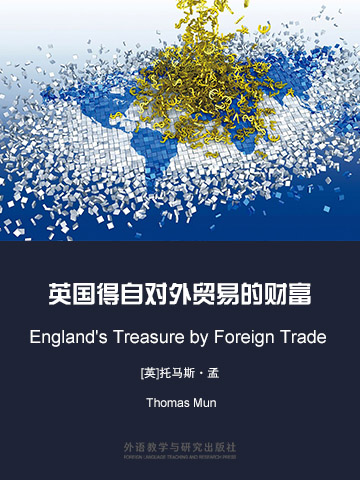托马斯·孟的《英国得自对外贸易的财富》一书,在历史上占据着不可磨灭的地位。马克思曾对该书给予很高的评价,被看作是 “重商主义的圣经”。他在谈到托马斯·孟这本改写后出版的著作时说:“这一著作早在第一版就有了特殊的意义,即它攻击当时在英国作为国家政策还受到保护的原始的货币制度,因而它代表重商主义体系对于自己原来体系的自觉的自我脱离。这一著作已经以最初的形式出了好几版,并且对立法产生了直接影响。”
托马斯·曼在《英国得自对外贸易的财富》一书中,详尽阐述了重商主义关于保护关税政策的基本原则、主张和意义。由于托马斯·曼将国外贸易差额看作是一国财富的标准,就必然导致“财富是战争的命脉”的“国防财政论”和“重税无害论”。他认为:“由于国土的大小,贫富的程度和贸易差额多寡等因素存在差异,政府获得收入的方法也随国家宪法、政府、法律和民俗的不同而大有差别。国王想要改变这些制度是非常困难的、危险的。即使国王以重税发财致富,国民却会因此而贫穷。不过,由于各国情况特殊,征课重税不仅是不得已的,是正当的,还是有利于国家的。因为幅员不大的国家,靠经常性收入是不足以蓄积抵御外国侵略所需的财富的。所以,这些国家不得不在平时课征重税,来积存现金和军火充当国防之用。非像一般所想象的那样,有害于人民的幸福。
England's Treasure by Foreign Trade was considered to be a direct repudiation of the arguments of Gerard de Malynes While Mun is often compared favorably to Josiah Child, another classic mercantilist. In it we find for the first time a clear statement of the theory of the balance of trade. According to Mun, trade was the only way to increase England’s treasure and in pursuit of this end he suggested several courses of action: frugal consumption in order to increase the amount of goods available for export, increased utilization of land and other domestic natural resources to reduce import requirements, lowering of export duties on goods produced domestically from foreign materials, and the export of goods with inelastic demand because more money could be made from higher prices.
- England's Treasure by Forraign Trade. or The Ballance of our Forraign Trade is The Rule of our Treasure
- Chapter 1 The Qualities which are required in a perfect Merchant of Forraign Trade.
- Chapter 2 The Means to enrich this Kingdom, and to encrease our Treasure.
- Chapter 3 The particular ways and means to encrease the exportation of our commodities, and to decrease our Consumption of forraign wares.
- Chapter 4 The Exportation of our Moneys in Trade of Merchandize is a means to encrease our Treasure.
- Chapter 5 Foreign Trade is the only means to improve the price of our Lands
- Chapter 6 The Spanish Treasure cannot be kept from other Kingdoms by any prohibition made in Spain.
- Chapter 7 The diversity of gain by Foreign Trade.
- Chapter 8 The enhansing or debasing our Moneys cannot enrich the Kingdom with treasure, nor hinder the exportation thereof.
- Chapter 9 A Toleration for Foreign Coins to pass current here at higher rates then their value with our Standard, will not encrease our Treasure.
- Chapter 10 The observation of the Statute of Employments to be made by strangers, cannot increase, nor yet preserve our Treasure.
- Chapter 11 It will not increase our treasure to enjoyn the Merchant that exporteth Fish, Corn, or Munition, to return all or part of the value in Money.
- Chapter 12. The undervaluing of our Money which is delivered or received by Bills of Exchange here or beyond the Seas, cannot decrease our treasure.
- Chapter 13. The Merchant who is a mere Exchanger of money by Bills cannot increase or decrease out treasure.
- Chapter 14 The admirable feats supposed to be done by Bankers and the Merchants Exchange.
- Chapter 15. Of some Excesses and evils in the Commonwealth, which notwithstanding decay not our Trade nor Treasure.
- Chapter 16. How the Revenues and Incomes of Princes may justly be raised.
- Chapter 17. Whether it be necessary for great Princes to lay up store of Treasure.
- Chapter 18. How much Treasure a Prince may conveniently lay up yearly.
- Chapter 19 Of some different effects, which proceed from Naturall and Artificial Wealth.
- Chapter 20. The order and means whereby we may draw up the ballance of our Foreign Trade.
- Chapter 21. This conclusion upon all hath been said concerning the Exportation or Importation of Treasure.
- 书评 写书评
- 笔记
-
书评加载中...





 京公网安备 11010802032529号
京公网安备 11010802032529号
笔记加载中...